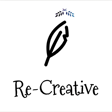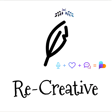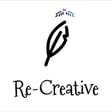Joe and Mark are joined by the super successful and super-fun science fiction writer, John Scalzi.
It's an entertaining conversation about science fiction, the egotistical nature of writing, and John's hobby, which is music.
In addition to having a terrible case of G.A.S. (guitar acquisition syndrome), John loves creating "weird ambient electronic music."
Mark and Joe learn all about John's amazing career in science fiction, his deadline-driven process, and the economics of that trade. But the conversation doesn't end there, as the three examine the value of creating art, just for the joy of it.
For more information, check out the show notes for this episode.
Re-Creative is produced by Donovan Street Press Inc. in association with MonkeyJoy Press.
Drop us a line at contact@donovanstreetpress.com to tell us what you think of this episode... or any other.




